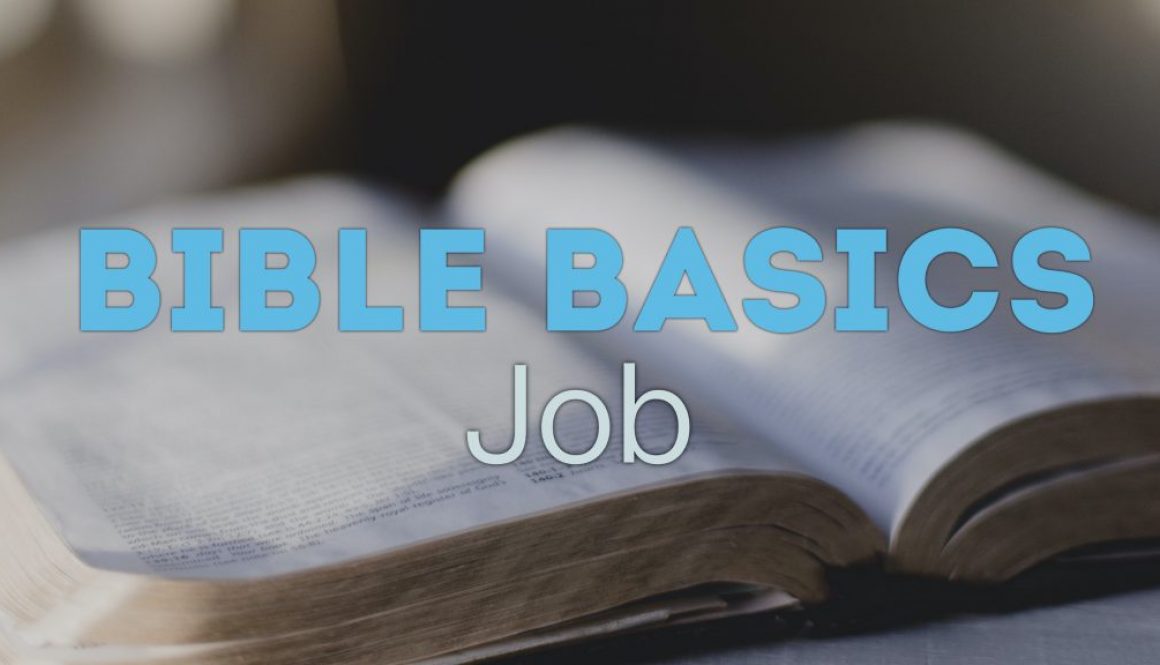Job
Author
The author of the book of Job is unknown. The book takes its name from its primary character, however most biblical scholars believe the book was written down from oral history at a later date, rather than being recorded by Job himself.
Date
The exact date of the writing of Job is unknown. Many scholars believe the book was likely written during the time of King Solomon.
The events of the book of Job likely took place between the Tower of Babel and God’s calling of Abraham (i.e. between Genesis 11:9 and Genesis 12:1). There is no reference to any of God’s covenants to Abraham or the Law of God, which are central to Hebrew theology from Genesis 12 onward. This means that Job was a believer in Yahweh, but outside of the covenant family of Israel.
Audience and Purpose
The fact that scholars believe the book of Job was originally passed through Jewish oral traditions means that the intended audience was the Jewish people. There was a value found in the story, which kept each generation passing it on to the next.
The purpose of the book was to remind the people the God always has a sovereign plan, and is trustworthy in the good times and bad. Job does away with any idea that God is keeping score, or that He works among mankind on an emotional basis.
Major Themes
- Overcoming Trials and Adversity.
- The Heavenly Host. The book of Job gives us great insight into the political workings of Yahweh and His heavenly host, or “the divine council.” (See also Isaiah 6 and Ezekiel 1.) It clearly shows Yahweh to be God above all gods.
- God’s Justice.
- Satan and Evil. Evil has a name. Mankind has a personal enemy. The devil is not just a force at work against humanity, but a person with a strategic mind to battle against God and His people.
Key Scriptures
- Job 1:21 — “And he said, “Naked I came from my mother’s womb, and naked shall I return. The Lord gave, and the Lord has taken away; blessed be the name of the Lord.”
- Job 38:3-4 — “Dress for action like a man; I will question you, and you make it known to me. ‘Where were you when I laid the foundation of the earth? Tell me, if you have understanding.’”
Outline
- Job 1:1-2:13 — Introduction
- Job 3:1-26 — Job’s Complaint
- Job 4:1-5:27 — Eliphaz Speaks to Job
- Job 6:1-7:21 — Job Responds to Eliphaz
- Job 8:1-22 — Bildad Speaks to Job
- Job 9:1-10:22 — Job Responds to Bildad
- Job 11:1-20 — Zophar Speaks to Job
- Job 12:1-14:22 — Job Responds to Zophar
- Job 15:1-35 — Eliphaz Speaks to Job A Second Time
- Job 16:1-17:16 — Job Responds to Eliphaz A Second Time
- Job 18:1-21 — Bildad Speaks to Job A Second Time
- Job 19:1-29 — Job Responds to Bildad A Second Time
- Job 20:1-29 — Zophar Speaks to Job A Second Time
- Job 21:1-34 — Job Responds to Zophar A Second Time
- Job 22:1-30 — Eliphaz Speaks to Job A Third Time
- Job 23:1-24:25 — Job Responds to Eliphaz A Third Time
- Job 25:1-6 — Bildad Speaks to Job A Third Time
- Job 26:1-14 — Job Responds to Bildad A Third Time
- Job 27:1-31:40 — Job’s Final Complaint
- Job 32:1-37:24 — Elihu Speaks to Job
- Job 38:1-41:34 — God Speaks to Job
- Job 42:1-6 — Job Responds to God
- Job 42:7-9 — God Responds to Eliphaz, Bildad, and Zophar
- Job 42:10-17— The Finale of Job’s Life
Gospel Summary
The book of Job does not fit well into the Old Testament historical narrative. Rather than building on the stories of God’s covenant people (leading to Christ), it instead gives us a glimpse into the life of faith of a single person who is living dedicated to God as King. Job forces us to ask the question, “why do bad things happen to good people;” or rather, “to God’s people?” Throughout the course of the narrative, there is not an adequate answer given to ease the human mind. Instead, the story of Job encourages us to remain faithful, anyways, even when an explanation is not given for our struggles, simply trusting that God’s glory and His justice will shine through in the end.
Job makes clear that the world does not work on a principle of karma; in which good is repaid with good and evil with evil. Instead, as we get a glimpse into heaven we find that we have a spiritual enemy, who is actively working against us (and against God’s Kingdom). As Job waits for deliverance, we understand that God’s justice will eventually triumph over that enemy, through the coming of Christ. All of Job’s questions throughout the book are answered in Jesus. Like Job, our only hope is to keep our faith in God, and to know that suffering is but for a moment compared to an eternity in God’s Kingdom.
© Anthony Scott Ingram 2020. All Rights Reserved.
Photo by Carolyn V on Unsplash
Unless otherwise indicated, all Scripture quotations are from The Holy Bible, English Standard Version®, copyright © 2001 by Crossway Bibles, a publishing ministry of Good News Publishers. Used by permission. All rights reserved.”
Please note that I do get a small kickback from Amazon for any purchases made using the links on this post. Should you choose to purchase from them, I just want to say thank you for further supporting my work in ministry!
